February 29, 4:00 PM Literature
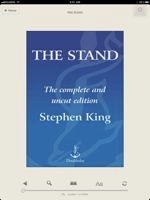 The action is beginning to pick up. I think I would prefer this version to the earlier (shorter) version. The thick descriptions do give one a much better sense of the characters and their backgrounds.
The action is beginning to pick up. I think I would prefer this version to the earlier (shorter) version. The thick descriptions do give one a much better sense of the characters and their backgrounds.
February 24, 9:00 PM Literature
 The plane gave me an opportunity to get back to a little reading with my iPad2. It didn't take long to get back into the flow of the Stephen King novel, "The Stand". I am now at the half-way point and am continuing to enjoy it.
The plane gave me an opportunity to get back to a little reading with my iPad2. It didn't take long to get back into the flow of the Stephen King novel, "The Stand". I am now at the half-way point and am continuing to enjoy it.
February 17, 12:00 PM Literature

I made good progress with "The Stand" while we were flying over the Pacific Ocean.
February 15, 8:00 am LiteratureLiterature

While getting ready for our drive to Calgary I happened to notice a book in the stand beside my chair in the living room. It was under a pile of model train magazines. The title was "Nothing Remains the Same" and it was written by Wendy Lesser, a literary critic and editor of a literary criticism magazine. I first read it a few years and loved it. There is a lot of yellow highlighting in it.
The book contains her comments while rereading a number of books. The title of the book comes from a Mark Twain letter. I have decided to take the book with me, reread it, and make a few more notes about it.
The first chapter is called Reflections. Lesser notes than when she was a young girl she read largely for the plot. She begins her book by deciding to reread Henry James' novel, "Portrait of a Lady". I have yet to read anything by Henry James - I really must rectify this.
James' book is the story of a woman and the choices, and subsequent consequences, she makes in her life. Lesser then says, "Now [Lesser in middle-age] I understood that nothing ends with such choices -there are always additional choices to be made, if one's life if to be interesting". This is the type of comment that I enjoy highlighting - whether in a memoir or a work of fiction. Lesser ties this into her description of how she now reads a novel: what decisions do the characters make, and why? Here is another personal quote from this chapter: "General conclusions, I often feel, are the enemy of perception.".
She then pats herself on the back by saying that she purposely constructed her life to avoid "the speeded-up, mechanized, money-obsessed existence that had somehow become our collective daily life". In part this involved "incorporating reading into my daily life".
I have always enjoyed reading. I can remember going to our town library on Wednesday evening, and again on Saturday afternoon (the only two times the library was open) and taking out at least 2 books from the "children's" section (The Hardy Boys, Ken Holt, Nancy Drew, the Black Stallion series, Tarzan, Biggles - a WWII flying ace, a series about a high school baseball player, ... I just did a Google search on Biggles - fascinating. But when I was going to university, majoring in mathematics, I had no time for recreational reading. When I graduated in 1965, the first thing I did was join Book-of-the-Month Club. I have been reading ever since.
One aspect of reading today that was not possible 10 years ago is being able to quickly do a Google search to find out more about almost anything that occurs to one. I think this is an important development. I am writing this on an iPad2 (with an external keyboard) and a wifi connection to the Internet so I can check my memory, and correct it when necessary. For example, I first thought that the name of the series of detective stories for boys was called Tim Holt. But google revealed that was the name of a comic book cowboy. Fortunately the search also came up with some hits for Ken Holt and those were the ones that corresponded with my memory.
Returning to Lesser's opening chapter - she mentions the following novels in this chapter:
- Anna Karinina
- Middlemarch
- Huckleberry Finn
- The Charterhouse of Parna
- David Copperfield
- Remembrance of Things Past
- Don Quixote
- The Letters of Henry James
- Greene on Capri
- Age of Iron
- Disgrace
- The Human Stain
- Contempt.
My early sense of literary criticism writing is the inclusion of references to a variety of novels and authors - which helps contribute to the critic's credibility. It also allows the reader to compare the list with one's own list of books read.
In my case I have read Anna Karinina, Huckleberry Finn, Remembrance of Things Past, Don Quixote, Age of Iron, and Disgrace. The latter two by Coetzee are ones that I know I have read, but I cannot remember any details at the moment. Perhaps I should reread them? Middlemarch has been on my "to do" list for some time.
The first step is to actually create a list! Okay, to begin:
- Nothing Remains the Same (Wendy Lesser) [rereading now]
- The Use and Abuse of Literature (Marjorie Garber) [reading now]
- The Stand (Stephen King) [reading now]
- Middlemarch (George Eliot)
- Age of Iron (J. M. Coetzee)
- Disgrace (J. M. Coetzee)
- Portrait of a Lady (Henry James)
Middlemarch is also available as a TV miniseries by Masterpiece Theatre. First the book, then the movie.
Now to pack the SUV and head north to Calgary.
February 14, 5:50 am Literature

Me: I want to continue playing with making a few notes for "The Use and Abuse of Literature" by Marjorie Garber. I now realize that this book is an example of literary study. As I understand it, literary study is exactly what it says, the study of literature. Three other terms are often used, somewhat interchangeably: literary criticism, literary theory, and literary history. I have then looked all four terms up in wikipedia. Literary criticism is the study, evaluation, and interpretation of literature. Literary theory focuses on the analysis of texts. Literary history emphasizes the historical development of literature.
Now for my sense of this. Literature is writing about some aspect of human nature and culture. Psychology and sociology also do this, the difference being in the type of language used. These disciplines use empirical data to make statements of varying generality. Literature on the other hand is often imaginative, using more ambiguous language and emphasizing interpretation rather than description to provide its meaning. The study of literature is an examination of these works. Some writers focus on writing while others focus on what they have written. Some may divide their time between both activities. An author of novels who also reflects, and writes, about these reflections does both. Garber is one who focuses on the study of literature. Having read the first few chapters of "The Use and Abuse of Literature" I am struck by the inherent ambiguities and contradictions in much of which she says. I consider this a strength, not a weakness. People are very, very complex. Cultures even more so. Writing about people and cultures should reflect this complexity and ambiguity. The danger is to simplify and come up with rigid statements and principles.
Garber: "In the pages that follow I will attempt not only to argue for but also to invoke and demonstrate the 'uses' of reading and of literature, not as an instrument of moral or cultural control, nor yet as an infusion of 'pleasure', but rather as a way of thinking." [p. 7]
Me: I like this. For me, literature is something that makes me think. "The Taming of the Shrew" makes me think about human relationships, particularly those between men and women. It does not attempt to suggest what I should think. Scholarly writing, paradoxically, does not usually make me think - it primarily provides me with information that I should remember and perhaps fit into a broader conceptual framework. Much of the thinking that does occur is at the level of detail, having to do with procedure or related studies. Literature is much more open ended and flexible in terms of what kinds of ideas happen next. Interestingly, this very process of writing these notes, which is, I guess, a form of literary study, has required me to seriously think about literature.

Me: The first chapter of Garber's book describes a 2004 study on literacy in the US. Among the top ten most read books in this survey, I have read all but Stephen King's "The Stand". I just went to the amazon.ca website to see if it was available and discovered there was a new revised version of this classic. I then went to amazon.com and learned that the new version was available as an ebook. Done. As soon as I click on the order icon I receive a message saying that it is now on my iPad2 and ready for reading. This is certainly better than trying to download a movie.
February 12, 7:30 am Literature

Me: I want to play with making a few notes for "The Use and Abuse of Literature" by Marjorie Garber. I underlined (in pencil) phrases and sentences that I thought were important when I read the Introduction. Now I want to have a close look at the overall structure of this chapter. I am going to try using a blue highlight to distinguish between the content of the book and my comments on that content.
Garber:
Introduction
Literature Then and Now
On the Importance of Unanswerable Questions
The Use of "Use"
The Art of Making Nothing Happen
Me: The first and third sections appear to be related to the title of the book but the second and fourth sections are provocative. I like the second section title - it immediately makes me think. And so does the fourth. The other chapters look to be more factual. Now let's select a few underlining quotes.
Garber:
- "literature" has changed from a personal attribute or characteristic (something one has) to an institution and a product (something one writes or knows). [p. 5]
- "... the 'uses' of reading and of literature ... as a way of thinking." [p. 7]
- "reading - not skimming for information or for the plot ... - is really hard to do; and why the very uselessness of literature is its most profound and valuable attribute" [p. 7]
- "... to return literature to the center, rather than the periphery, of personal, educational, and professional life." [p. 7]
Me: I like the idea of considering reading and literature as a way of thinking. That is what I am doing at the moment. Reading is not "barking at print" (a phrase I first heard from Larry Miller) but trying to grasp the meaning and understanding of the text. And this is indeed hard to do. There are at least two parts to this activity. One is to appreciate the point, or points (for there are often many, and these have nuances, and are within a context) that the author is trying to make. The second is to embed that point within one's personal sense of understanding, which is constantly in flux, and which has numerous shades of stability and connectivity. Science, mathematics, philosophy, history, psychology, ... , or as the left-margin of this page indicates - birding, cooking, geocaching, life, literature, musings, technology and trains.
Garber: Literature Then and Now
- "Today novelists and poets are read and praised, but by a smaller subsection of the population, since they now compete with films, television, the Internet, and other modes of cultural leisure." [p. 8]
- "To overschematize a little for the sake of argument, let us say that there are two poles in the debate over the 'use' or 'value' of literature. One pole is utilitarian or instrumental, ... the other is ecstatic, affective, or mystical. [p. 9]
- "The only condition that I can think of attaching to the composition of the novel is ... that it be interesting." [Henry James] [p. 12]
Me: While reading the above section I came across the quotation, "Do I dare to eat a peach?" This meant nothing to me so I typed the expression into Google and found the following poem: "The Love Song of J Alfred Prufrock" by T. S. Eliot. [ http://www.wussu.com/poems/tsepruf.htm ] I do not recall ever seeing this before. It is a powerful poem! Thank goodness for the Web, and Google. The Henry James quote reminds me, again, of Larry Miller: "Is it a good yarn?"
I also came across the phrase "close reading". Once again, Google: http://www.fas.harvard.edu/~wricntr/documents/CloseReading.html
This reference is from Harvard, which is also where Marjorie Garber is a professor. Much of what I am doing at the moment would seem to qualify as close reading. I once used the phrase "slow reading", which is based on a similar idea, in a professional paper at an AusWeb conference.
Garber: On the Importance of Unanswerable Questions
- "Notice that Barthes stresses the role of questions, rather than answers. This is a point that needs to be emphasized in trying to explain the specificity of literature in comparison with other modes of writing, thinking, and research." [p. 18]
Me: I agree that questions are important. But this is true of any field that one is trying to understand. Mathematics is primarily about learning to ask good questions. One of my favorite mathematics books is a slender volume called "The Art of Problem Posing" (1983) by Stephen Brown & Marion Walter. One of my criticisms of modern mathematics education is the over-emphasis on problem solving to the exclusion of problem posing. Questions are the cornerstone of any investigation. But most academic disciplines place a premium on learning to ask answerable questions - literature may well be unique in asking unanswerable questions. I like this. It feels right.
I did not do any underlining in the last two sections of this Introduction.
February 11, 6:00 PM Literature
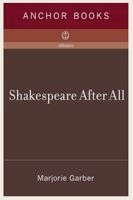
I read Garber's description of "The Taming of the Shrew" yesterday and read the play today. I definitely am finding her comments useful and make the reading of the actual play much more enjoyable.
Even though I have never seen the movie starring Richard Burton and Elizabeth Taylor, I was always reading the play with images of the two of them in the starring roles.
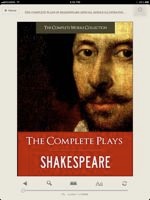
I find that I am reading the play much like I read a poem. The archaic English lends itself to a rhythmic sub-vocalization. I occasionally miss the meaning of a witty reparte but it is not a problem as the overall flow of the language keeps the play moving forward. The ending, particularly Kate's last speech, caught me by surprise. It was much stronger than I was expecting, unless the entire speech was meant as irony. The more I think about it, the more I like the ironic interpretation. Kate, and Elizabeth Taylor, had too much spirit to ever be subservient.
Having read the play I am now eager to see the movie.
I have just done a quick check and the DVD of the movie is available at the public library.
February 10, 1:00 PM Literature
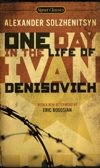
I finished this short novel (only 150 pages) this morning. It is a unique novel, and set a new example of how to compose a novel. I found it both enjoyable and moving. It is not a Hollywood novel with lots of action and critical incidents, but rather one that describes the tedium and routine of another day in the gulag. There are clear lessons on how to survive, and how not to. I can see why it is considered a classic.
February 9, 3:00 PM Literature
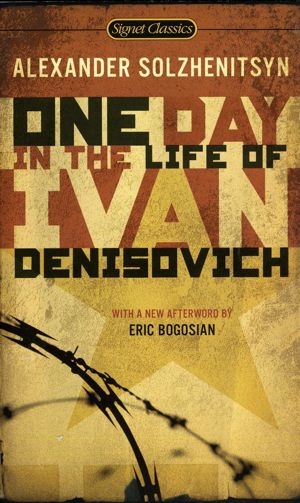
I am looking for a short novel and have opted for a Russian classic. This is one that I have seen mentioned on numerous occasions but have never read. I bought it late last year and this is a good time to finally read it.
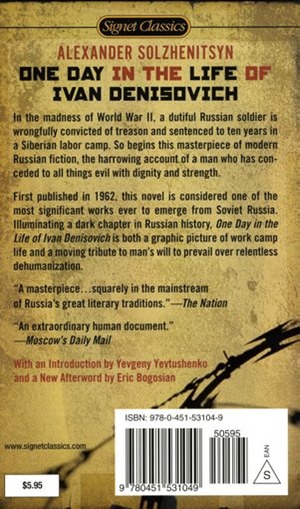
February 9, 9:30 am Literature
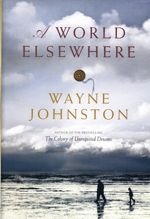
This is an amazing yarn. Totally, and utterly, captivating. Writing at its very best. Layers upon layers of meaning. To construct a story this powerful from four sentences of factual history is awesome. I am not likely to forget this book.
February 7, 8:30 PM Literature

I made a good decision when I decided to buy "A World Elsewhere". Wayne Johnston is a special kind of author. This is a very powerful novel, one that sneaks up on you when you are simply reading it for enjoyment.
I have just googled "Vanderbilt mansion" and found the following site: http://www.biltmore.com/
Much of the novel takes place here. But this is a novel, and a work of fiction. However the mansion is real, actually, surreal. Incredible.
February 4, 5:30 PM Literature
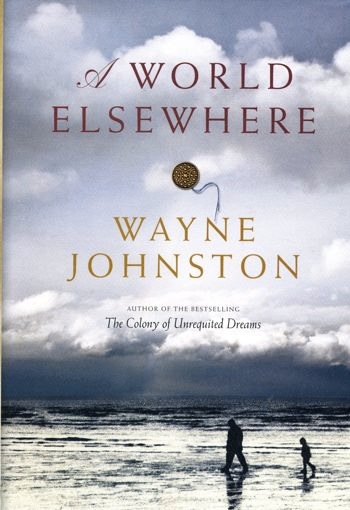
I have decided that my next read will be the Canadian novel "A World Elsewhere" by Wayne Johnston. I have read most of his novels and have always enjoyed them. He is a special kind of wordsmith.
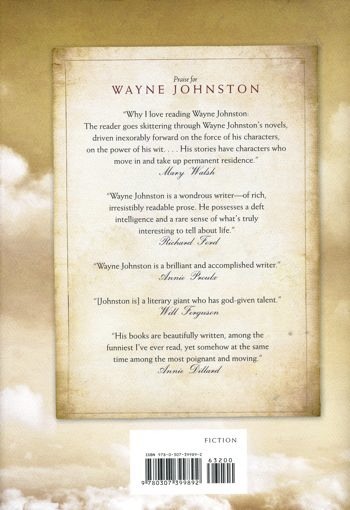
February 4, 12:30 PM Literature
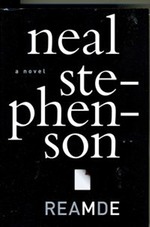 Definitely a good readme. A page-turner, and one with a lot of pages.
Definitely a good readme. A page-turner, and one with a lot of pages.
February 3, 9:00 PM Literature
 This is rapidly coming to an end. There is still lots of action left, but one can see the various threads converging. I have really enjoyed this story. It helps that I am familiar with much of the area and have visited a number of these places. Less than a hundred pages to go, but I will stop now and leave the conclusion for tomorrow morning.
This is rapidly coming to an end. There is still lots of action left, but one can see the various threads converging. I have really enjoyed this story. It helps that I am familiar with much of the area and have visited a number of these places. Less than a hundred pages to go, but I will stop now and leave the conclusion for tomorrow morning.
February 1, 9:00 PM Literature
The pace and suspense is beginning to build again. This is definitely a good yarn. Much of the action has shifted to southern British Columbia and Washington state.

The following definitely caught my attention:
"But geocachers had been at work planting Tupperware containers and ammo boxes of random kinickknacks in tree forks and under rocks in the vicinity of that turn around, and people kept visiting those sites and leaving their droppings on the Internet, making cheerful remarks about the nice view, the lack of crowds, and the availability of huckleberries. Normally Richard and the Schloss's other habitues would have at least another month of clear driving before these people began to show up, but these RVers had apparently decided to get a jump on the tourist season and be the first geocachers of the year to make it to the sites in question." [p. 719]